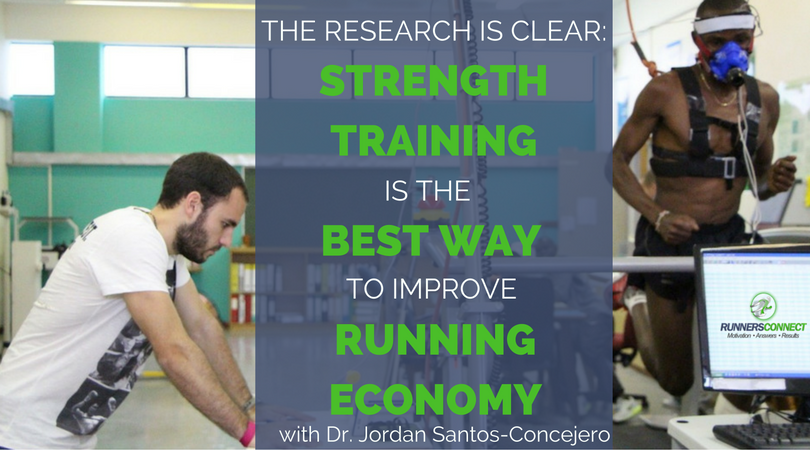
Dr. Jordan Santos-Concejero- The Research is Clear: Strength Training is the Best Way to Improve Running Economy

Run to the Top Podcast | The Ultimate Guide to Running
Shownotes Transcript
If you love the science behind running, this is the episode for you!
I’ve brought Jordan Santos-Concejero on the podcast today to discuss a little bit of his research on the physiology and the biomechanics behind the art of running.
Dr. Santos started out as a professional runner, but trying to keep up with competitive running and work on his PhD at the same time became a bit much.
Besides, he was much more interested in the research behind what makes a good runner truly great. He’s spent a majority of his research career studying Kenyan runners and their successes.
He breaks down genetics and human evolution and then combines them with modern training in order to uncover what makes professional runners so successful.
If you’ve ever had any questions about your stride, your strike, or even your genetic disposition for physical fitness, tune in now!
Here are some of the topics we’ll discuss today:
Finding the balance between diet, rest, and training hard Why strength training is so important for runners Dr. Santos’ research on ground contact time, cadence, and striking All of the different factors that influence running economy The touchy subject of genetic doping Questions Jordan is asked:
3:45 What was your international running career like?
5:05 How did your dad inspire you to run?
5:26 Do you have any advice for new runners?
6:20 What was the highlight of your running career?
7:06 How long did it take you to balance training hard with resting right?
7:52 Why did you decide to retire from running?
8:48 Do you still run for fun?
9:55 Did you always know you wanted to study running academically?
12:20 When did running economy come into your research?
13:18 Are you an economical runner?
14:07 Why should runners focus on strength training?
15:15 What kind of strength training should runners do?
16:06 How often should we go to the gym?
18:03 Why did you focus your research on Kenyan runners?
19:40 Can you share some of your findings with us?
21:30 What is the ground contact time you study?
23:16 What are your theories on efficient ground contact times?
25:07 Do you see people moving to Kenya for training?
26:43 How can European runners imitate Kenyan training?
27:31 Do you see people messing with genetics in the future to be better runners?
29:55 How is your research working against genetic doping?
32:11 What is your research on running cadence and stride?
35:40 Did you find any differences in running cadence with different types of runners?
36:50 Should we just stick with the stride that is comfortable for us?
37:53 What is your research on striking?
39:45 Can we change heel striking to forefoot striking?
40:40 The pros and cons of barefoot running
42:30 How does it feel to be a researcher?
43:50 Where do you see your research going in the future?
47:12 The Final Kick Round!
Quotes by Jordan:
“Training hard is important, but actually it’s more important to get enough rest.”
“I can’t run for fun, I can only run for performance.”
“Strength training is a key training to improve your performance…and reduce risk of injury.”
“Short ground contact time will improve running performance. You can improve your ground contact time by improving your stiffness with strength training.”
“If you don’t do physical activity when you are a kid, some of the physical adaption that [Kenyans] have, you will never get.”
“If you try to change your running cadence consciously, your running economy will be worse.”
“The most economical runners strike on their forefoot.”